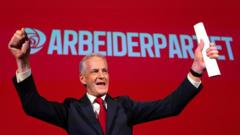Can Norway's Left Hold Power Amidst the Rising Populist Right?

Published: 2025-09-09 09:00:36 | Category: technology
Norway's Labour Party, led by Jonas Gahr Støre, has successfully secured a second term in the recent general elections, overcoming a significant challenge from the right-wing Progress Party, which doubled its vote share. The Labour Party achieved 28.2% of the vote, allowing it to potentially form a narrow majority in the Storting, Norway's parliament, by collaborating with four smaller centre-left parties. The election saw a high voter turnout of 78.9%, reflecting the electorate's engagement with pressing domestic issues such as rising living costs and the oil industry.
Last updated: 09 October 2023 (BST)
Key Takeaways
- Labour Party wins 28.2% of the vote, securing 53 seats in the Storting.
- The anti-immigration Progress Party gained significant ground, achieving 24% and 48 seats.
- High voter turnout of 78.9%, the largest in years, highlights public engagement.
- Coalition talks are expected to take weeks, focusing on policy disagreements.
- Domestic issues, particularly living costs and wealth tax reforms, dominated the campaign.
Election Overview
The recent elections in Norway have reaffirmed the Labour Party's position in a political landscape increasingly influenced by right-wing populism. With 28.2% of the vote, Labour has made gains compared to the previous election in 2021. This success allows them to potentially form a narrow two-seat majority by gaining the support of smaller parties, which is particularly important in a country accustomed to minority governments.
Rise of the Right-Wing Progress Party
The Progress Party, led by Sylvi Listhaug, has emerged as a significant force, doubling its vote share to nearly 24%. This surge translates to 48 seats in the Storting, positioning them as a formidable opposition force. Despite their gains, the Progress Party, alongside other right-wing parties, fell short of the 85-seat majority required to form a government, leaving them unable to challenge Labour's leadership effectively.
Voter Turnout and Engagement
The election saw an impressive turnout of 78.9%, the highest in several years, indicating a robust public engagement with the electoral process. This turnout is reflective of the heightened political consciousness among the Norwegian populace, driven by pressing domestic issues such as economic concerns, immigration, and the implications of global conflicts.
The Impact of Domestic Issues
While foreign policy, particularly the wars in Gaza and Ukraine, initially dominated campaign discussions, the focus shifted towards domestic issues as the election date approached. Rising living costs, the oil sector's future, and reforms concerning wealth taxes were central themes influencing voter decisions. Many Norwegians have expressed concerns over the wealth tax, with reports indicating that hundreds have relocated to countries like Switzerland to avoid excessive taxation.
Coalition Building: Challenges Ahead
Coalition building is set to be a complex process for the Labour Party. Should they succeed in forming a majority, they will need to navigate policy disagreements with smaller left-leaning parties. Key areas of contention may include the future direction of Norway's oil industry and how to manage the investments of the country’s substantial sovereign wealth fund.
Support for Labour and Key Figures
The Labour Party's success has been bolstered by the recent appointment of Jens Stoltenberg, former NATO chief and a well-respected figure in Norway, as finance minister. His involvement has likely enhanced Labour's credibility and appeal among voters, particularly in a climate where international relations and economic stability are paramount.
The Future of Norway's Political Landscape
As the Labour Party prepares for the next term, they face several challenges, including addressing the concerns raised by the Progress Party and other opposition groups. Sylvi Listhaug's acknowledgment of the "four tough years ahead" for Labour indicates a contentious political environment, with ongoing debates expected over immigration policies, economic management, and Norway's role in international affairs.
With coalition talks anticipated to extend over several weeks, the future direction of Norway's government remains uncertain. The outcome will significantly influence the nation’s approach to pressing issues such as climate change, economic diversification, and social welfare policies.
What Happens Next?
The coming weeks will be crucial for the Labour Party as they engage in coalition negotiations. As they seek to solidify their majority, the Labour leadership will need to address the diverse concerns of smaller coalition partners while also responding to the rising influence of the right-wing Progress Party. The outcome of these negotiations will set the tone for Norway’s political future and its approach to both domestic and international challenges.
FAQs
What percentage of the vote did the Labour Party receive in the recent elections?
The Labour Party received 28.2% of the vote, securing 53 seats in the Storting.
Who is the leader of the Progress Party?
The Progress Party is led by Sylvi Listhaug, who has been a prominent figure in Norwegian politics and has recently highlighted the challenges facing Labour's government.
What were the main issues during the election campaign?
Main issues included rising living costs, the future of the oil industry, and reforms to the wealth tax, which has prompted some citizens to relocate abroad.
How long will coalition negotiations take?
Coalition negotiations are expected to take several weeks, as Labour seeks to align policies with smaller centre-left parties.
What implications does the election have for Norway's international relations?
Labour's second term may impact Norway's stance on international issues, particularly regarding its commitments to NATO and its role in addressing global conflicts.
As Norway navigates its political landscape in the wake of recent elections, it faces both opportunities and challenges. The dynamics between Labour and right-wing parties will shape the future of governance and policy direction in the country. How will these changes influence Norway's role on the global stage? #NorwayElections #LabourParty #ProgressParty



